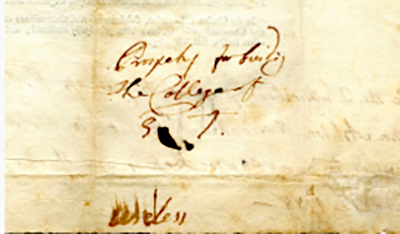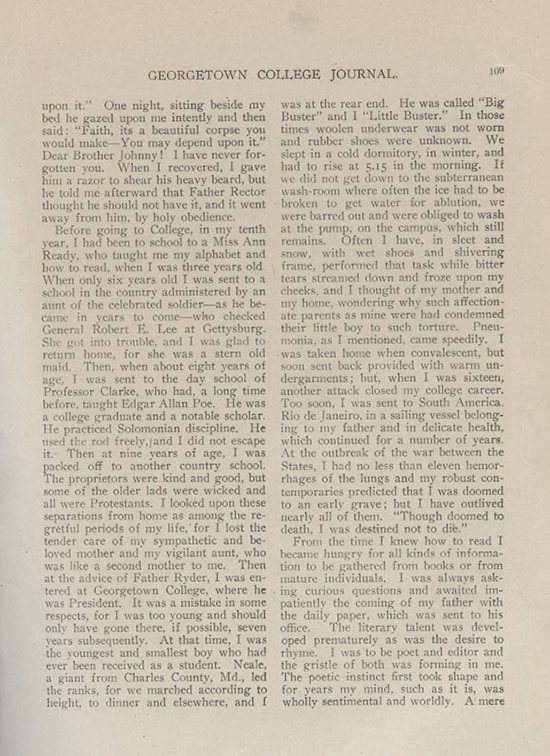October 8, 2020
October is American Archives Month. To celebrate, University Archivist Lynn Conway sat down with Cassandra Berman to talk about archives at Georgetown.
What is your position at the Booth Family Center for Special Collections? Can you tell us briefly what it entails?
 My job title is Georgetown University Archivist. That means I collect, organize and preserve records relating to the history of the University and help people access and use those records. I also teach instruction sessions in which I introduce students to records in the archives and, from time to time, curate exhibitions (both physical and online) which focus on aspects of the University's history.
My job title is Georgetown University Archivist. That means I collect, organize and preserve records relating to the history of the University and help people access and use those records. I also teach instruction sessions in which I introduce students to records in the archives and, from time to time, curate exhibitions (both physical and online) which focus on aspects of the University's history.
Why did you get into the archival profession? What was your path to your current position?
I love history, which is probably part of the answer any archivist will give to that question. While I was in college in the U.K., I had an internship at PRONI (the Public Records Office of Northern Ireland) and enjoyed every part of it. If I remember correctly, my main project there was organizing breeding records for pedigree bulls. Content-wise these were probably not the most interesting records (which is why I suspect they were given to an intern) but I loved the idea that what I was doing would help anyone who needed to access them in the future. After studying archive administration in graduate school and a transatlantic relocation, I came to Georgetown. That was 26 years ago.
What do archives mean to you? Why are they important at this current moment?
When the Georgetown University Archives celebrated its 200th anniversary in 2016, I spoke at a celebratory event and said that archives reveal the past to provide context for the present and to inform the future. And while I'm not sure of the decorum of quoting myself, I do think that is probably still the best answer I can give about what archives mean to me and why they are always important.
Can you tell us about an especially significant, interesting, or unexpected item or items you've come across in one of your collections? Do you have a favorite type of item to work with—diaries, letters, yearbooks, etc.?
One of my favorite things to come across are notes in margins or on the backs of records. These can provide a glimpse into reactions to the records or to the information they contain and sometimes add information which isn't available anywhere in official University records. A great example of this is a note written on the back of the Proposals, the document which Georgetown's founder, John Carroll, circulated in 1787 to raise money for starting the University. We don't know who wrote it but it perfectly sums up the results (or rather lack of results) of John Carroll's fundraising efforts - it reads: Prospectus for building G T College. Useless.

I also like working with student-produced records, such as letters written home, for similar reasons—they add realism and color to the facts, figures, and dates found in University-produced records. The content of these records can be amusing but they can sometimes be plaintive as well, especially when students talk about the spartan conditions they endured in the 18th and 19th centuries. I found an especially evocative letter published in the December 1906 issue of the Georgetown College Journal (our student newspaper at that time) which was written by poet, journalist, and alum James Ryder Randall. In it, he describes his life as a nine- year-old student in 1848: . . We slept in a cold dormitory, in winter, and had to rise at 5.15 in the morning. If we did not get down to the subterranean wash-room where often the ice had to be broken to get water for ablution, we were barred out and obliged to wash at the pump, on the campus, which still remains. Often I have, in sleet and snow, with wet shoes and shivering frame, performed that task while bitter tears streamed down and froze upon my cheeks and I thought of my mother and my home, wondering why such affectionate parents as mine had condemned their little boy to such torture. Pneumonia . . . came speedily . . .

I'd love to know about a pop culture representation of archives, archivists, or historical documents that you've come across -- and whether it made you amused, frustrated, or something else entirely?
Most fictionalized representations of an archives, in my experience, seem to involve dimly lit and dusty spaces with, of course, few if any researchers. And these "archives" are often staffed by cardigan-wearing archivists with a penchant for being at best unhelpful and at worst an unyielding barrier between "their" records and anyone who wants to use them. I will confess to liking cardigans (it can get chilly in our climate-controlled storage spaces) but everything else about how archives are usually depicted is wrong and a little maddening. I work in a modern space that underwent a multi-million dollar renovation a few years ago. We are certainly not a low-trafficked area, in non-pandemic times anyway—there have been instances when every seat in our research room has been occupied. And like all my colleagues in the Booth Family Center, I work hard to connect researchers with the materials they need for their research projects.
